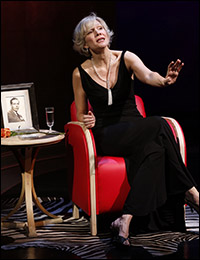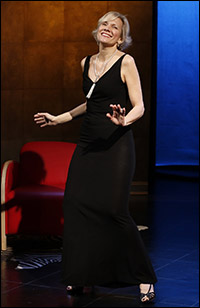
On the surface of it — and it has gone through several surfaces over the past four years — love would seem to be in short supply in Love, Linda, a one-woman show composer Gary William Friedman arranged for his wife, jazz singer Stevie Holland.
It purports to tell, in 75 minutes and 17 Cole Porter songs, a story that has never been told onstage, let alone sung, before — what the subtitle calls The Story of Mrs. Cole Porter (or how to hang together for 34 years with a great songwriter who's a closeted homosexual).
Love, Linda, scripted by Friedman and Holland, started out a cabaret act, playing The Triad and other such venues, before it evolved into a genuine piece of theatre that is now playing the York Theatre through Jan. 5, 2014. Lyricist Richard Maltby Jr., who has been known to stitch storytelling songs into whole shows (Ring of Fire and the Tony-winning Ain't Misbehavin'), was hired to direct the show into the homestretch.
The challenge, of course, has been to find an authentic love story in this unique set-up. In small clubs where the piece seemed coyly evasive, it loomed like an elephant. Now, as theatre, it has matured and deepened, becoming more frontal and modern.
"The approach in the previous environment — which was more nightclubby than this real legitimate theatre environment — created some of that performance," admitted Holland. In this current reincarnation, her character addresses the issue right off the bat: "If the goal of the curious is just to find what label to put on something, then I'm afraid I must speak," Linda says. "Marriage is not a can of soup, and, just because a love between two people may be difficult to define, that doesn't mean it didn't exist." Maltby fast-forwarded to the close of the play where that logic is still holding: "The last thing Linda says in the play is: 'But did we ever have to define our love? No, we didn't. It may not have been a picture-perfect postcard, but what a journey it was!'
"We all know from our own lives that there are so many increments of relationships and love affairs. It's because of our paucity of imagination that we keep trying to find terms for these things. We're actually as a country in a crisis of trying to understand what anything is. It isn't what we thought it was, and I think we're sorta ready to receive this story. Even though it's a story that took place in the '20s and '30s and '40s, it doesn't feel like a period piece. I find that completely modern — totally a story for now because the whole universal acceptance of gays has changed in the last few years — and, as it changes, it also opens the door to all the other variations.
| |
 |
|
| Stevie Holland | ||
| Photo by Carol Rosegg |
Quick! Somebody cue Porter's haunting "What Is This Thing Called Love?"
That song comes up early, of course. Throughout the show, biographical bits are sprinkled between and, frequently, into numbers, giving them a new meaning in the context of the story being told. "My Heart Belongs to Daddy" is introduced late into the proceedings when the Porters appear bound for the divorce court, but, in the middle of it, Porter suffers a horse accident that left him crippled the rest of his life; his wife rushes to his side, never again to leave. She starts the song promiscuous, giddy with new freedom, making "a play for the caddy," and ends up Mother Teresa.
Quite a few Porter evergreens are on display, but there is also quite a few non-mainstream numbers. "'Ours' was new to me," confessed Friedman. "It's become one of our all-time favorites," seconded Holland. "And is that ever an ear worm!" added Maltby. "Oh, boy, I spent a week trying to get rid of that song. Even now, I can't.
"And do you not love the fact that you sit down at a show about Cole Porter, and the first thing you hear is this melody you've never heard before? 'What is that?'" That is "When a Woman's in Love," used instrumentally at the start of the show and sung at the end. "It was never in a show," noted Holland. "It was a trunk poem that he later set it to music. I like to think in my heart that he really wrote it for her."
People have come up to Friedman after the show, wagging their finger at him and accusing him of writing that song. "Do you know what it took to admit I didn't?"
| |
 |
|
| Stevie Holland | ||
| Photo by Carol Rosegg |
Maltby brought some tough love to the project. "The structure of the show was there," he said. "All I've done is to work for clarifying what the moment in the story is. What's going on at this moment in this sentence? Are you actually saying what you mean? Sometimes we turned sentences around, sometimes added a phrase to make it completely clear. The idea was there but not totally registering its depth."
"Richard and I talk about the melody of Linda's dialogue we came with," Holland said. "A lot of what we've done is get rid of old melodies and bring in new ones."
That's not as easy as it sounds, Maltby pointed out. "When you have done a show like this, you tend to set line readings after a while. Pretty much, you find the one that's the right one, and that became our enemy in going forward because they were set on a version that didn't go quite as deep. Time after time, we had to break the rhythm in order to get to the sentences. It wasn't that we had to find other sentences and we had to rewrite it. The stuff was already in the writing. We just really had to find it."
One Maltby touch: The pianist leading the three-piece combo accompanying Holland has been placed downstage with his back to the audience, suggesting Porter. "As soon as I thought of that, I thought immediately that it broke out of the mold of the cabaret show with the pianist sitting there. As soon as you turn it around, it's like a living room, and the person at the piano becomes a kind of living presence. Even the sheet music has been painted on pale blue paper so it's not very bright when the light hits it. We went that far to make sure it's not a big white presence over there." Friedman, who composed Platinum, Taking My Turn and the Tony-nominated The Me Nobody Knows, is currently working on another musical biography with Holland, who has taken over the book and lyrics from Friedman's longtime partner, Will Holt.
It's called Dream Mountain, and that would be Mount Rushmore. The show focuses on the man who spent the last 14 years of his life sculpting it, Qutzon Borglum. "He was obsessed with it, and, ultimately, it did him in," said Friedman. "He died before it was finished, and his son took over. It's a very heroic, Americana kind of story."
"Also," postscripted his wife and collaborator, "it tells the story of native Americans and their reaction and feeling toward their sacred mountain being destroyed."
Maltby, in his lyricist hat, has his own musical Americana bio to get back to — Take Flight, about the heroic figures of early aviation (The Brothers Wright, Earhart, Lindbergh, et al). It recently touched down at Montclair State University and went over so well that he and his longtime composing partner, David Shire, and their book writer, John Weidman, have decided to resume tinkering with it for Broadway.
Theatregoers might hear a few selections from it Dec. 17 when 54 Below presents Maltby & Shire: What Could Better Be in its ongoing salute to great American songwriters.

Evan-Zimmerman-for-MurphyMade.jpg)







